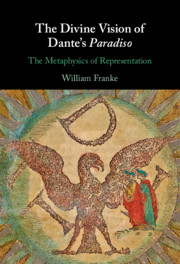Book contents
- The Divine Vision of Dante’s Paradiso
- The Divine Vision of Dante’s Paradiso
- Copyright page
- Contents
- Figures
- Prologue
- Acknowledgments
- Note on Translations and Primary Source Editions
- Part I The Literary Vision
- Chapter 1 Writing as Theophany: The Medium as Metaphor for Immediacy
- Chapter 2 The Presence of Speech in Writing: Speaking as Sparking
- Chapter 3 The Parts of Speech: Mediation and Contingency
- Chapter 4 From Speculative Grammar to Visual Spectacle and Beyond
- Chapter 5 Sense Made Sensuous and Synaesthesia in the Sight and Sound of Writing
- Chapter 6 Infinite Script: Endless Mediation as Metaphor for Divinity
- Part II Philosophical Reflections
- Appendix Paradiso XVIII. 70–136
- Index
Chapter 2 - The Presence of Speech in Writing: Speaking as Sparking
from Part I - The Literary Vision
Published online by Cambridge University Press: 26 August 2021
- The Divine Vision of Dante’s Paradiso
- The Divine Vision of Dante’s Paradiso
- Copyright page
- Contents
- Figures
- Prologue
- Acknowledgments
- Note on Translations and Primary Source Editions
- Part I The Literary Vision
- Chapter 1 Writing as Theophany: The Medium as Metaphor for Immediacy
- Chapter 2 The Presence of Speech in Writing: Speaking as Sparking
- Chapter 3 The Parts of Speech: Mediation and Contingency
- Chapter 4 From Speculative Grammar to Visual Spectacle and Beyond
- Chapter 5 Sense Made Sensuous and Synaesthesia in the Sight and Sound of Writing
- Chapter 6 Infinite Script: Endless Mediation as Metaphor for Divinity
- Part II Philosophical Reflections
- Appendix Paradiso XVIII. 70–136
- Index
Summary
Dante’s vision presents the letters of Scripture as the speech of God. In Dante’s text, speaking (favellare) is presented as sparking (sfavillare), which makes it a kind of writing, a communication through a contingent, combustible, material medium. Speech, as the immediate communication of intention, is unmasked by Dante, long before Derrida, as grounded in the mediations of writing, with all the latter’s materiality and contingency. Dante explores the implications of the medium of writing as itself supremely significant, thereby opening a vista reaching all the way to modern and contemporary art. Dante’s text, in effect, performs the miracle of making the invisible God to be seen by deconstructing the sign as signifying a definable intention and opening signification infinitely, instead, to the immediate and infinite presence of the medium. This highlights the immediacy of the divine presence in writing. Its written medium is key to achieving the immediacy that characterizes Dante’s vision and makes it God’s “speech.” Speaking, as a sort of sparking, makes divine revelation in the Word of Scripture, as seen by human understanding, the revelation of an unpredictable indeterminacy. The spectacle of written letters of Scripture as sparking in heaven concretely presents what nevertheless remains an incommunicable transcendence of all that can be intentionally articulated in finite, human language. Randomness and absolute contingency are the hallmarks of a speech that is not merely human and guided by definable intentions, but a communication of the transcendent.
Keywords
- Type
- Chapter
- Information
- The Divine Vision of Dante's ParadisoThe Metaphysics of Representation, pp. 55 - 86Publisher: Cambridge University PressPrint publication year: 2021

